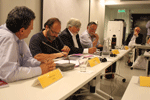Published on Thu, 2014-04-10 17:32
The World Bank is a structural driver of the land grabs that is dispossessing and impoverishing rural communities across the globe. It is a central player that is using its financial and political might to force developing countries to follow a pre-prescribed model of development, based on the neoliberal principles of privatization, deregulation, low corporate taxation and ‘free market’ fundamentalism. Evidence clearly shows that this model overwhelmingly favors large agribusiness interests at the expense of smallholders, and is designed to extract the maximum value from developing countries’ natural and human resources. Join us to tell the World Bank that it has no business in ranking countries and opening them up to foreign corporations thirsty for the extraction of their resources and the exploitation of their work force. |
Published on Thu, 2014-04-10 14:51
A statement issued today by the ITUC and its Global Unions partner organisations in advance of this weekend’s Spring Meetings of the IMF and World Bank (Washington, 11-13 April) calls on the international financial institutions (IFIs) to take concrete actions to follow through on their announced intentions to pay greater attention to employment and inequality issues. The ITUC notes the IMF’s World Economic Outlook forecast made on Tuesday that economic growth will strengthen in 2014, in large part because of “a strong reduction in the pace of fiscal tightening”. ITUC General Secretary Sharan Burrow stated: “We are pleased to see the IMF recognise that drastic fiscal consolidation policies have been a drag on growth, something that unions have been saying since the inappropriate shift to austerity made in 2010.” However she also observed that threats to growth may increase in emerging-market economies because of capital outflows. “The IFIs should help boost aggregate demand in countries with output and employment gaps and ensure that their financial support maximises decent work creation,” said Burrow. |
Published on Tue, 2014-04-08 14:56
“Partnerships” for sustainable development are increasingly being promoted as a major, if not the primary, enabler for the implementation of the successor international sustainable development goals to replace the Millennium Development Goals (MDGs) by 2015. However, a growing number of civil society groups warn against a partnerships approach that places primary emphasis on enticing private sector participation and investments as this risks reinforcing the corporate capture of the post-2015 agenda. This one-and-a-half hour Public Forum seeks to provide critical perspectives on the major issues and challenges associated with partnerships with the “private sector” for sustainable development. |
Published on Fri, 2014-04-04 10:40
Alternatives to austerity programs do exist, conclude civil society organizations and networks from around the world that met in Montevideo, convened by Social Watch to discuss strategies to face the multiple global crises. In the opening of our debates, the Uruguayan ministers of Interior, Eduardo Bonomi, of Labour, José Bayardi, and of Social Development, Daniel Olesker explained the way in which they managed to eradicate extreme poverty, reduce inequalities and grow at the same time. See the video here. (To see the English subtitles, press on the CC at the bottom right of the video). |
Published on Thu, 2014-04-03 17:37
In a panel discussion held in Dhaka Reporters’ Unity Mr. Roberto Bissio, the Coordinator of Social Watch, a global civil society alliance working in more than hundred countries, said that the enforcement for human rights and addressing inequalities should be the main concern in setting post 2015 development agenda. The panel discussion titled “Post 2015 Development Agenda: Future Global Development Partnership” organized by EquityBD, Social Watch Bangladesh and Unnayan Samunnay. The panel discussion is moderated by Rezaul Karim Chowdhury of EquityBD and other speakers of the session are Ahmed Swapan of VOICE, Aminur Rasul of Unnayan Dhara Trust, Prodip K Roy of Online Knowledge Society, Dr Sohel Iqbal, Badrul Alam of Bangladesh Krishok Federation (BKF) and Barkat Ullah Maruf of EquityBD. |
SUSCRIBE TO OUR NEWSLETTER







